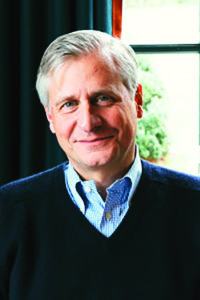Citizenship’s Ultimate Stress Test
June 15, 2022 For presidential historian and Pulitzer Prize-winning author Jon Meacham, this country is at its most perilous times since the first shots of the Civil War. The pandemic, social injustice, and Jan. 6 attack on the Capitol have all increased the contentiousness and division that is testing American democracy with mid-term elections on the horizon.
For presidential historian and Pulitzer Prize-winning author Jon Meacham, this country is at its most perilous times since the first shots of the Civil War. The pandemic, social injustice, and Jan. 6 attack on the Capitol have all increased the contentiousness and division that is testing American democracy with mid-term elections on the horizon.
In May 2018, Meacham published “The Soul of America: The Battle for Our Better Angels,” which covered the contentiousness and polarization in present-day America by looking back at critical times in history when hope overcame fear and division. He spoke with the Detroiter about the stress test facing democracy and his belief it can still persevere despite its deep challenges.
What is the current state of our democracy?
We’re in as perilous a place as we’ve been at any juncture since Fort Sumter. There is a force abroad in the land that tends to the autocratic and one that embraces the notion that total victory is the only thing that they’ll settle for. That puts the rule of law, the give and take of politics as a means of mediating differences, at risk. And the next couple of years may well determine whether or not the constitutional republic, as imperfect as it has been, will long endure.
How different is this than previous difficult times?
The essential difference flows from January 6th, 2021. As grave and deep as our earlier crises have been, we never had an American president who decided to try to hold onto power by denying the reality of the will of the people, and presently encourages a lie about the election that fundamentally undermines trust in the institutions that have served us well for 240 years. What we’re living through right now is a stress test of citizenship. And what everybody’s facing is a choice between supporting the institutions that enable us to win some and lose some, or to support a movement that has proven it’s willing to take extraordinary measures to have its own way, no matter what the cost.
So how do we get through this stress test?
You find people who are willing to listen. The president and national leaders have an obligation to continue to make this case, however difficult the obstacles seem. In public leadership, you actually never know exactly who is listening or what impact it will have. And we’ve always been a divided country. Our biggest moments of seeming consensus are 60-40 moments. That means that at our moments of seemingly greatest consensus, 40% of the country still disagreed. I think that the fate of the country is, historically speaking, often determined by that middle. And I don’t mean middle in terms of independents, but that 15% to 20% who are not immovably attached to one party or the other. You have to speak with an eye toward those folks hearing it, and then in elections acting on it with their votes.
How important is the work of the January 6th committee in moving beyond this crisis?
The committee’s work is vital. I think the fact-finding is essential. I think the ability of the committee and the Congress to present the facts of that day in a convincing fashion is really important. There’s always a huge chunk of the country that believes what it believes and is impervious to new information. That’s a perennial human characteristic and that’s not going to change. But there are some reachable folks. And I think that what the committee does and how they do it will be really important when you look at the 10% to 15% of the country that is actually open to argument.
So is this workable consensus still possible?
Absolutely. Democracy is a counterintuitive form of government. Because it requires the two of us to see each other, not as rivals or adversaries, but as neighbors. If I decide that you are simply a rival and that any victory for you is a loss for me, then democracy doesn’t work. And so it’s that covenant: I want you to do well, so that I’ll do well. That’s the case that American leaders at their best have successfully made, and I think we still can.
James Martinez is editor of the Detroiter magazine and a content creation consultant in Southeast Michigan.
“Democracy is a counterintuitive form of government. Because it requires the two of us to see each other, not as rivals or adversaries, but as neighbors. If I decide that you are simply a rival and that any victory for you is a loss for me, then democracy doesn’t work.”
-Jon Meacham, Presidential Historial and Pulitzer Prize-Winning Author
